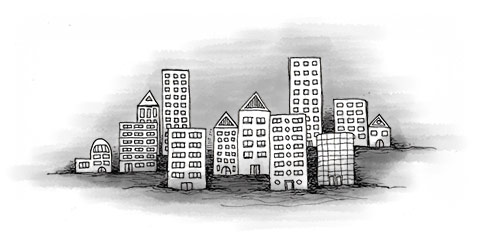A normal lease should contain the following details:
· Security Deposit Amount
· Monthly Rent
· Lease Terms
· Building Rules and Special Clauses
· Utilities/Services
· Conditions for rent increases
In the case of furnished rooms, you should also draw up an inventory, which lists all the items in the apartment and their condition, and is signed by you and your landlord. Have this in writing so that you don't have to pay for any damages when you move out.
Once the contract is signed, both parties are legally bound by it. It is therefore essential to carefully read and understand the contract, even though they are sometimes long and difficult to read, before signing it. Be aware that American landlords will expect the contract to be fully observed by the tenant. However, there are legal protections which can limit the validity of certain clauses within rent contracts (generally to your advantage).
Security Deposits
Most landlords ask for a deposit which is refunded when you move out, along with the interest earned. However, if damage has occurred to the accommodation the landlord is allowed to withhold that money to patch the place up.
A security deposit is almost always required to offset the cost of repairing any damage caused by you during the lease. Find out what the deposit covers and the necessary conditions for the refund. You should inspect the property with the landlord and note any damages in writing and/or take photographs.
Many states require landlords to place your security deposit in a separate, interest-bearing account and pay you the interest it earns while you are living in the rented accommodation. Most landlords require a deposit equivalent to one or two months of rent.
Rent and utilities
Rent is the amount paid to the landlord every month. Gross rent is the rent plus the extra costs such as garbage disposal, electricity, heating and water costs (depending on the contract). These extra costs are called utilities .
Additional costs depend on the apartment and its location and are individually detailed in the contract. Things such as heating, gas, water and electricity usually depend on personal usage. In the US, meters are usually read on a monthly basis, although you are often billed on a bimonthly or even quarterly basis.
Most landlords expect rent to be paid by check and this is usually specified in the contract. Some landlords can require you to have a renters insurance to cover them in the event of damage to their own property or liability for adjoining properties but this is common practice.
Building Rules and Special Clauses
A lease will also contain general rules which apply to you as a resident tenant. Many rental communities have a set of guidelines which helps the tenants co-habit peacefully and respectfully. These may be included on the lease. In larger apartment blocks with numerous tenants, these rules are often summarized on a separate agreement (the building rules). Among other things, they normally stipulate that between 22:00-08:00 excessive noise is prohibited. In some cases they also regulate who is responsible for cleaning shared facilities like staircases, entrance areas and the basement on particular days.
Take notice of these rules as breaking them can give your landlord the legal right to kick you out of the apartment. This can come as a bit of a shock to foreigners coming from less ‘regulated’ countries, but do not be surprised if your housewarming party causes complaints from your new (and very angry) neighbors.
Manager: In medium-sized or large buildings, there is often a manager. They are responsible for making sure everything runs smoothly as well as scheduling repairs.
Pets: Whether or not pets may be kept in an apartment must be discussed with the landlord and should be part of your rent agreement. If a tenant wants to have a pet in the flat where they already live, the rent contractor or the landlord should be consulted first to make sure this is allowed. House pets are classified as dogs, cats, birds, hamsters, etc.
Lease term
Most leases are for a one-year term. Unless otherwise stated on the lease, most contain a clause allowing the lease to continue on a month-to-month basis. A month-to-month lease is an agreement for a one-month time period that is renewed automatically each month for another month until terminated by either side. A thirty day notice is usually required to terminate the month-to-month agreement. A tenant must mail or hand-deliver a written notice of intent to the landlord to terminate the lease. Note that the landlord cannot cancel the rent contract without a reason.
Defects and liability
Before moving into rented accommodation, make an appointment with the landlord to inspect it for any defects (scratches, stains, wear and tear or damage). Write everything down, even if the damage appears to be minimal, otherwise you may find you will be charged for the repairs or your deposit will not be fully repaid when you move out. The list of defects and damage must be signed by the landlord and kept by you.
When you move out, the same kind of appointment should be made with the landlord or manager to verify defects and damage. If the accommodation is in a noticeably worse condition than at the start of the tenancy, the landlord may retain the deposit paid by the tenant in part or in full. Otherwise, a written document of the transfer stating that the apartment has been transferred without defects or damage and that the deposit should be repaid in full will be prepared.
It is advisable to have an American friend or colleague who knows the procedure with you to make sure there are no linguistic misunderstandings.
Keys
Another important part of your lease is the listing of keys you've been given. Make sure you receive all keys stated in the document. If you lose any keys to your home, you will be held liable for having the locks changed, and if you loose a key to a common area, you will probably have to pay for new keys for your neighbors as well. Be careful - normally you cannot just make copies of keys in a shop, as many modern keys are numbered and you will probably need permission from the landlord to make a copy.
When moving into a new home, you might want to consider replacing the locks as you have no idea how many keys there are in circulation from the existing locks. If you plan to change locks, you need permission from your landlord to do so. Note that many door locks in America don’t lock automatically and you need a key to lock as well as open them. Inside doors often have locks that are locked by pressing a button on the centre of the doorknob or by pushing or twisting the knob itself. If you find this type of lock on external doors, you should change them as they are not secure.


